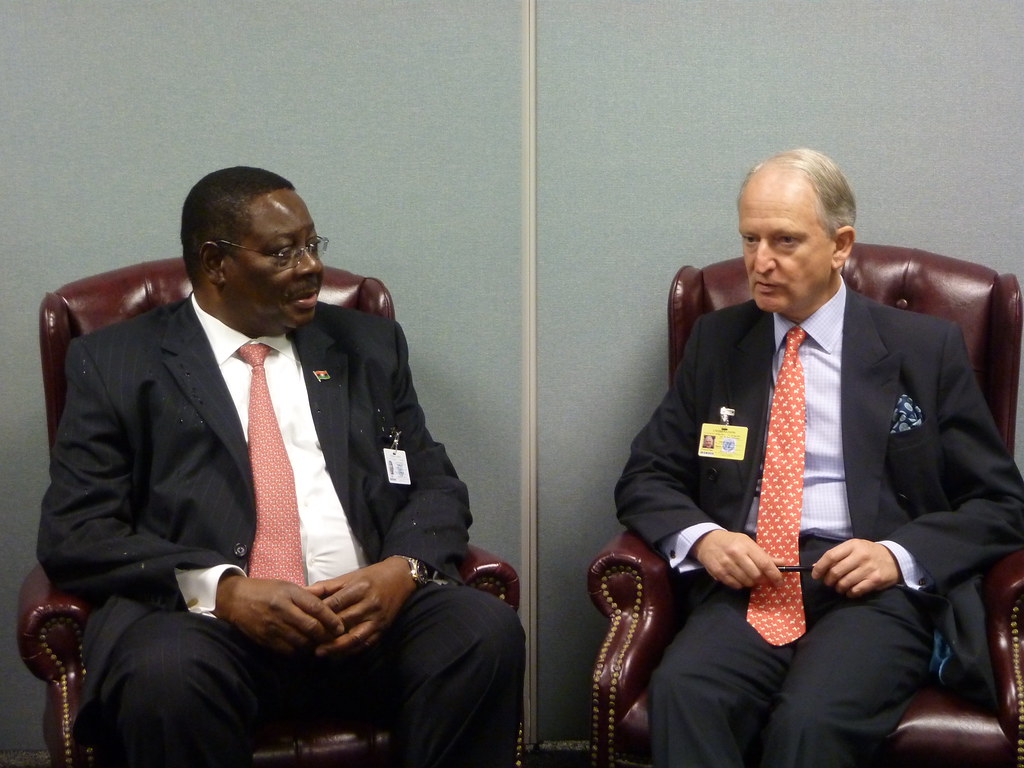A question of competency
A very short introduction to Peter Mutharika, Malawi's new President.

Then Malawi foreign minister, Peter Mutharika, with a British diplomat in 2011 (UK Foreign Office, via Flickr CC).
After a prolonged dispute, Peter Mutharika was sworn in as Malawi’s fifth president a few days ago. Whatever the ins and outs of the electoral process, nobody is in doubt that Joyce Banda, the darling of the international community, was decisively defeated at the ballot box. To find out more about Malawi’s new president and what we should expect, we asked our very own Jimmy Kainja for his thoughts.
So we hear Malawi has a new President and the voters sent Joyce Banda packing. Were Malawians not impressed by her being listed by Forbes as the 47th most powerful woman in the world 2013?
To be honest, very few Malawians would’ve heard about Joyce Banda’s inclusion on Forbes’ list of most powerful women. And being a country where the rural majority still see their leaders as folks to be worshiped and praised, her inclusion wouldn’t have raised eyebrows. Joyce Banda has lost simply because the glamorous “reformer” Joyce Banda that the international community knew was not the same Joyce Banda Malawians knew. At home Joyce Banda oversaw a government with more corruption scandals than any administration before it. At home she was an arrogant president who toured the country and the world on a daily basis, ignoring her people’s call to cut expenditure. It’s more a case of Banda losing elections than Mutharika winning.
So who’s the new guy? Haven’t we seen him before?
Peter Mutharika is a brother of Malawi’s former president, the late Bingu wa Mutharika who died of heart attack on 5th April 2012. Peter is an academic with 40 plus years lecturing in American universities. Under his brother’s presidency, he served as minister of education and minister of foreign affairs. These portfolios brought some serious questions about his competency in terms of running public institutions. While at education, University of Malawi (Chancellor College) was closed for eight months due to various disagreements with unhappy lecturers and students – most notably lecturers’ demands for academic freedom. While at foreign affairs Malawi expelled a British high commissioner to Malawi, which sparked a diplomatic crisis between Britain and Malawi. It took Joyce Banda’s presidency to restore Malawi’s relationship with the UK.
Can you sum up President Peter Mutharika in three words?
Curious. Resolute. Inaudible.
We heard he was terrible as foreign minister. Any signs he’ll be any better as president?
He was. Whether he’ll be any better only time will tell. He’s an academic and we can only hope he learned his lessons. The team he chooses to work with will be crucial, even more important will be his willingness to take advice.
How old is he really? Is it possible he’s had years taken off his official age “for good behavior”?
He’s officially 74 years old. I cannot speculate whether this is his real age or not, that’s hard to prove. There were no birth certificates in 1940 to prove it either way.
What were Mutharika’s key policies during his election campaign?
I think he had the best manifesto of all the 12 candidates. I’m being subjective on this because I believe a lot of problems in Malawi have to do with governance structures. He’s promised to have up to 20 ministers and deputies in his cabinet. This is half of what his three predecessors: Bakili Muluzi, Bingu wa Mutharika and Joyce Banda used to have. He also promised to reduce presidential powers, which again is another crucial area, power is too centralised in Malawi. We’ll see whether he’ll do it or not. But these stand out for me, the rest will follow.
Are people hopeful he can lead an effective government? What are the main changes you anticipate under a Mutharika government?
Mind you, 64% of Malawians did not vote for him, so he has a lot of people to convince. He can’t take his victory for granted. He doesn’t come across as a podium kind of a politician, as his brother, Joyce Banda and Bakili Muluzi all were. So he may spend some time in the office and work. He has hinted that he’s interested in building new friendships with the BRICS, alongside Malawi’s traditional donors. This is a give away that he’s not sure of the western support yet. So foreign policy will definitely take a different direction – an interesting one to watch.
What does his election mean for the University of Malawi? We remember Mutharika didn’t have the best relations with many academics during his time as Minister of Education?
Again, we are yet to see what happens now. These are some of the issues that pre-elections debates overlooked or deliberately left out. It would have been wonderful to have these answers. Though on education he has promised to introduce community colleges for people to learn trades and enhance their skills within their own communities.
What would an average Malawian say to Peter Mutharika if they met him in the street?
Pre-election surveys by CCJP (a local Catholic NGO) and Afrobarometer separately indicated that most Malawians were most worried about food security, economic stabilization and national security. So I guess these would be the areas. Curiously, there’s no education and health but these are areas that also need a serious revamp.
What would an average Malawian say to Joyce Banda if they met her in the street?
It depends on their political affiliation but the truth is that Joyce Banda had the goodwill of a majority of Malawians. If the 20th May elections had been held a year ago Joyce Banda could have won, probably with a landslide. But she took people’s goodwill for granted so I guess she would be told something about that disappointment. Joyce Banda’s loss is an own goal.



















